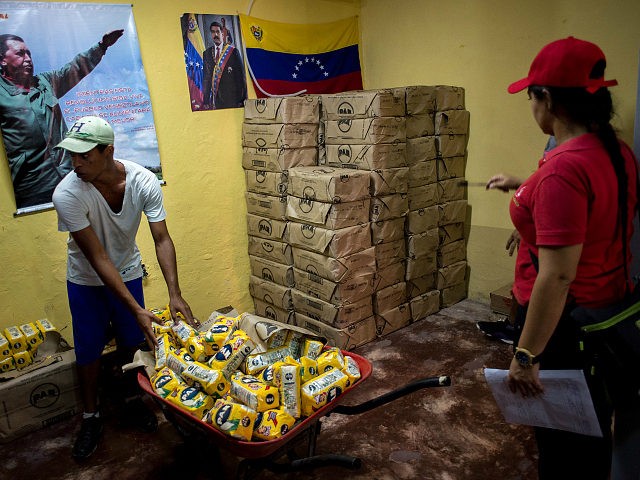A socialist food distributor in Venezuela was arrested this week for keeping “faulty” food packages and selling them on the black market for 10,500 bolívars, about one-fourth of the state-mandated minimum wage monthly salary.
While Delimar Ríos, former head of a local Zulia state council, pocketed the profits for herself, the official price of the packages distributed by the Local Committees for Supply and Production (CLAP) can go as high as 14,000 bolívars. According to conversion estimates by Dolar Today, which tracked the value of Venezuela’s bolívar separate from official government claims, 10,500 bolívars is worth an estimated $2.80, while 14,000 bolívars amounts to $3.73.
At the beginning of January, Maduro announced that the new national mandatory minimum wage would be 40,638 bolívars monthly — about $60 using official government currency exchange rates, but $10.68 according to the Dolar Today exchange. The government significantly downplays inflation rates, which are estimated to soar as high as 1660 percent by the end of 2017.
Ríos and her husband were arrested after having established their scheme for some time, earning her the nickname “the queen of the CLAP.” The couple would brand a certain number of government-provided food packages as faulty and unfit for distribution, then sell them to starving Venezuelans on the side.
While their price on the black market was lofty, it was actually less than some legal prices for CLAP redistribution in other areas. In Mérida state this week, Governor Alexis Ramírez announced that some packages would cost as much as 14,000 bolívars due to “transportation” costs.
CLAP packages were never meant for the general public to have the option of buying. The packages — plastic bags with tiny supplies of rice, flour, eggs, and milk — are meant to last 21 days per household, despite their paltry supplies. Upon Caracas announcing the new program in June 2016, the packages carried “3 kilos of rice, a kilo each of sugar and milk, a bag of beans and a liter of oil.” Shortly after the establishment of the CLAP, dictator Nicolás Maduro placed the nation’s entire food supply in the hands of the military, whose troops have let tons of food rot in ports where distributors refused to pay bribes.
CLAP leaders must distribute packages of food as they see fit in their communities. As those in charge of the food supply are members of the United Socialist Party of Venezuela (PSUV), the opposition has protested that the food aid is a form of coercion — those who do not participate in socialist activities will be left without food.
“This is another one of these great swindles the government has perpetrated on the Venezuelan people,” Miranda governor and opposition leader Henrique Capriles Radonski said this week. “We are seeing the people protest because the bags [of food] don’t come, and the few that do arrive are distributed based on political preferences.”
Yet even those who are not adversely affected in food distribution through their political affiliation have protested that the CLAP packages never came, and the few that did were barely edible. In one case highlighted by Dolar Today, a couple took a photo of their package of “flour,” which they lamented had gotten wet at some point in the transport process and become a cement block, causing the other food items in the package to rot.
Maduro has championed the CLAP packages as “a socialist response to the crisis and the economic war,” a term he has repeatedly used to refer to a conspiracy he alleges the United States has organized to collapse the Venezuelan economy.
Most Venezuelans struggle to procure three meals a day for their families, a product of gross mismanagement of the economy under Maduro’s socialist regime and that of his predecessor, Hugo Chávez. A poll released in September 2016 found that 15 percent of Venezuelans rely on digging through supermarket dumpsters for edible items to survive.

COMMENTS
Please let us know if you're having issues with commenting.